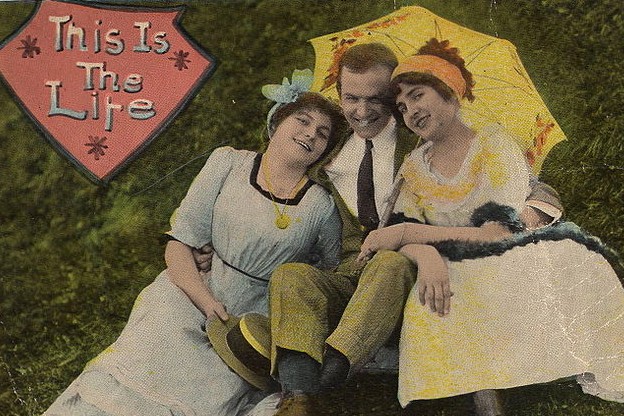

Madame Flutter By turns in another stunning performance!
It is duty, nothing more, that compels me to write about Katherine Kersten’s op-ed piece in the Strib on Sunday last: The faulty case for changing marriage laws. Her effort bears a haunting resemblance to the ghosts of Katie past:
Kersten says that if you are against a ménage à trois or a marriage between siblings, even a non-sexual one, you must be against gay marriage.
Yes, Katie, and if you’re against cannibalism, you must abhor transubstantiation.
Katie’s argument is only slightly less vile than the one espoused by Rick “Man on Dog” Santorum, at least he did back before the voters booted him out of the Senate.
Kersten vaguely remembers the phrases “slippery slope,” “camels’ noses,” and “parade of horribles” from her law school days, and she wads them up into a little spitball here and delivers it with a splat on the noses of her unsuspecting readers.
But it’s interesting, in a gruesome kind of way, because Kersten and most of the other writers opposing gay marriage have abandoned the Bible as grounds for opposing gay marriage, at least in public, relying rather on tradition and the timeless ways [timeless ways are Katie’s favorites] of the world to justify themselves.
This, kids, is a loser. If you read Kersten closely — although frankly, I don’t recommend it — you will see that she is merely advocating her cultural preference.
Not that the Biblical arguments are very good either, relying on either the pre-science, fabric-blend hating, tattoo banning, marry the wife of your dead brother whether you want to or not, stone the non-virgin brides, spare the rod and spoil the child Old Testament, or the mullet-hating (really), slavery-loving Apostle Paul — a great evangelist, but kind of a misanthrope.
You do have to appreciate Kersten’s problem: what’s a bigot to do?
Reduced to its bilious essence, Kersten’s point is that a mommy and a daddy are best because that’s the way we’ve always done it. Doctors bled people for a long damn time, too, before they figured out it wasn’t always the answer.
But the Canadian Sociological Association (among others) found that the sex of parents made no difference in the development and adjustment of children; two was better than one, but the sex of either was irrelevant. I’ve quoted the research before. (At the moment, I am writing on a teeny laptop and don’t have access to all the links and research that I have saved.) And Kersten’s views fly in the face of my own personal knowledge of same-sex couples who have perfectly adjusted children and gays and lesbians who have wholesome relationships with other people’s children.
Katie also makes the argument that we support marriage because of procreation. Why then, do we permit old people and the infertile to marry, and why don’t we exact a promise to have children when people get married?
The benefits of marriage and manifold and manifest. Katie’s bigotry is the only reason not to sanction same-sex marriages. The only reason. Which brings me to the last part of her argument, which the irony-dead Kersten makes without, well, irony:
Finally, if support for one man/one-woman marriage becomes the social equivalent of racism, people who believe all children need and deserve a mother and father will face persecution in the public square. The state’s massive civil-rights enforcement regime will bear down upon them, effectively silencing them and sometimes even putting their employment at risk.
This is called, dear Katie, a taste of your own medicine.
Update: Nuts. I forgot the best part:
If these words, taken from a manuscript preserved in the Vatican and dating from the year 1147, were for a bride and bridegroom, no one would find them startling:
“Send down, most kind Lord, the grace of Thy Holy Spirit upon these Thy servants, whom Thou hast found worthy to be united not by nature but by faith and a holy spirit. Grant unto them Thy grace to love each other in joy without injury or hatred all the days of their lives.”
That prayer, however, is part of a ritual joining two men in some kind of a solemn, personal, affectionate relationship, a ritual that, according to John Boswell, the A. Whitney Griswold Professor of History at Yale, “functioned in the past as a ‘gay marriage ceremony.’ ”
Amid the debate about whether Christianity should bless unions between homosexuals, Professor Boswell contends that it already has.
Scouring collections of medieval manuscripts from Paris to St. Petersburg and from the Vatican to the monastery of St. Catherine on Mount Sinai, he has turned up more than 60 texts, dating from the 8th to the 16th centuries, of Christian ceremonies for what has been variously translated as “spiritual brotherhood,” “adoptive brotherhood” or what Dr. Boswell believes to be a more neutral term, “same-sex union.”
Katie doesn’t even have her timelessness straight.
Thanks for your feedback. If we like what you have to say, it may appear in a future post of reader reactions.

